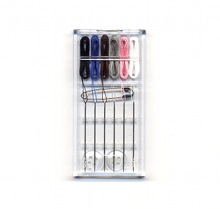When you need it the most, a helping hand has already helped you
Datum: 2012-11-28 11:00

The other week I stayed at a nice hotel in the center of Oslo. If you travel a lot, you will be aware of that the standard of hotels can vary significantly. Some places do not try very hard to do make it a pleasant stay while others bend over backwards to please their guests.
Something that might seem unimportant but which I tend to notice is what items they have put together and placed on the bathroom counter. How much I like the hotel will most times correspond with how well this little kit corresponds to my needs (which might be why they put them there in the first place).
Needle and thread
Amongst lotions, shoe-shine sponges and shampoo on a little tray on the sink, I found a small sewing kit.
I just so happen to be weak for sewing kits: not because I am overly excited about sewing, but because I have a tendency to lose buttons when I least have the time to sew them back on. (I remember one time when I had only a few minutes to get to a lecture and had to stop at Holmens Herr, an upscale store for men’s clothing here in Gothenburg, to get a button sewed onto my jacket, but that’s an entirely different story.)
The sewing kit contained six threads of different color, a safety-pin, two buttons and six needles. There wasn’t anything special about this. But, what made me love this particular sewing-kit so much was that the threads had been threaded on the needles.
Wasn’t this particularly thoughtful?
The button rarely falls off when we have plenty of time to sew it back on. When we are stressed, we do not have to spend time and energy on trying to get the thread through the eye of the needle, but can focus on sewing it back on quickly and then get on with what we were doing. They have prepared everything for me, so when I do not have much time to play with, as much as possible is already done.
This is something to remember and which can be applied to a number of other situations.
Care for your future self
So, help yourself by preparing what you will thank yourself for later in advance. Since when we have slim margins, we want as much as possible to be completed already and have only a few steps to complete before the task is done.
The fewer things we need to take care of, the more likely it will be that we have time to do them and the probability that the quality of the result is better also increases.
Do this
- Take out a pack of Post-Its or something like it.
- Think through your everyday life and draw to mind the situations when you are the most stressed, when you have the least time, are in the greatest hurry, when things tend to get hectic.
- Is it just when you are about to leave work for the day (“Now I will get home late again.”)?
- Is it when you are about to pass the security-check at the airport?
- Is it when you are checking in your luggage at the airport?
- Is it when you need to make the commuter train after the last meeting of the day?
- Is it when you are leaving home to make it to the first client meeting of the day (which you really do not want to be late for)?
- Is it just when you are about to step into the client meeting?
- Is it the last few hours before finishing the report that has a deadline at midnight.
- Or is it some other situation?
- Write every situation on a separate note and place it in front of you.
For each note, think of one thing you would like to have prepared and ready for the next time you are in each situation.
You can for instance write: “Prepare: The images for the presentation sorted and in the right order.”For each thing you would want to have completed the next time that particular situation occurs, figure out how you with as little effort as possible could prepare it and when would be the best time to do it.
Now, do not just leave this as an exercise, but take what you have realized seriously.- Have a look in your calendar and look for when one of the stressful situations most likely will occur next time.
- Create a to-do-task that means doing what you want to have done in advance, or better yet, do it right away (and be done with it).
When the situation occurs, enjoy that it is at least a little easier to handle and give yourself a little pat on the back as a thanks for being so thoughtful and preparing for your future self.
You will thank yourself
If you have prepared what you would otherwise have to do when you are the most stressed on beforehand, you will handle the stressful situation better. You will get through it easier and faster and have more time to reflect, proofread and make sure you deliver the high quality you have the ambition to deliver.
The probability that you have time for what you need to do and leave work on time, increases. Perhaps you will be able to sink into the seat on the train home comfortably (rather than sitting stressed on a bench at the train station waiting for the next departure).
What is your way?
What do you most enjoy having prepared? Write a comment to let us know!




